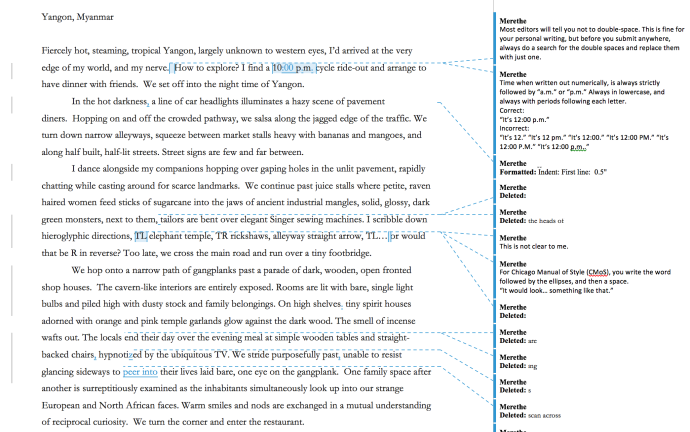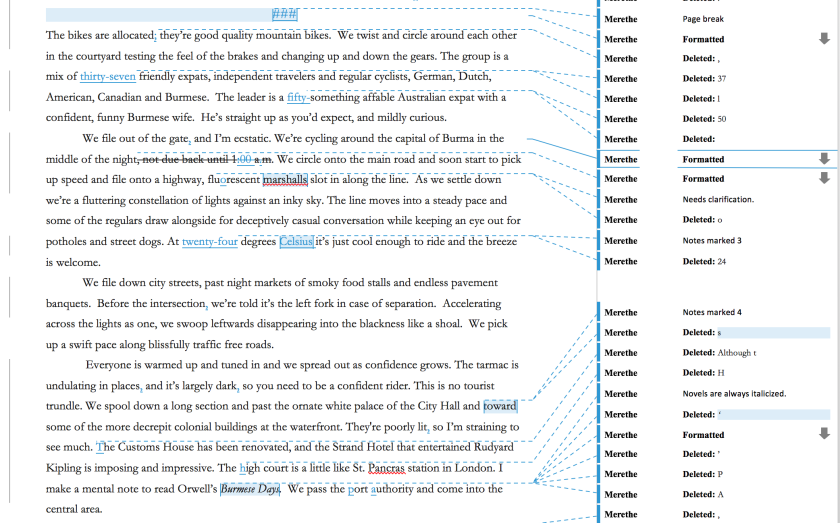One of the most common misconceptions that I run across in writing is when to capitalize things, and when they should stay lowercase. This is honestly a big issue, and can take your manuscript from potentially looking professional to seemingly amateurish in a heartbeat. It can be the difference between an agent or publishing house thinking that you know what you’re doing, or thinking that you started writing a week ago.
Proper capitalization in your writing is important for several reasons.
- There are already pretty firm rules in place about this subject, so expressing ignorance of it means that you might also lack ignorance of other conventional writing rules.
- If you Capitalize random words, It can make your Reader’s Voice messed up. Try reading This without doing a Weird version of Internal Puberty voice Changing in your Head. Can’t Do it, Can ya?
- Capitalization is often used for emphasis or importance, but this is really, really, not the best use for it. It’s called “vanity capitalization,” and editors literally hate it. Capitalization should be kept to proper nouns (people’s names, place names, etc.), the first word in a sentence, and of course, proper titles.
One of the biggest no-no’s I’ve seen is confusing capitalization of honorifics. For some people, this can be a very difficult subject to broach, as there are many rules regarding the use of honorifics, and some of them are confusing.
What are honorifics? Honorifics are essentially “titles” that you give to people. Think sir, ma’am, mister, doctor, etc. For those of you writing medieval fiction, there are also the titles of royalty and lords. This can all get a bit confusing when you’re trying to figure out what needs to be capitalized, and what needs to be lowercase. So let’s start with some clarification!
When a title should or should not be capitalized:
First things first, NEVER capitalize “the” unless it’s the first word of your sentence or it’s the first word of your book/movie/art title.
“I saw The Secret Life of Pets the other day.” vs. “This is The Book of Shadows.” The second one is wrong. It will make your editor/agent/reader/publisher cringe. Don’t do it!
Sir & ma’am: Are only capitalized when they are the first word in a sentence.*
Correct:
“Sir, I’ve got some bad news…”/ “But what were you hoping to hear, ma’am?”
Incorrect:
“I’ve got some bad news, Sir.” / “But what were you hoping to hear, Ma’am?”
* The only time this would be different is if you are introducing someone who’s been knighted, like Sir Elton John, or Sir Patrick Stewart. These are now titles that include the proper noun that makes them capitalized.
“Oh my goodness, it’s Sir Patrick Stewart! May I have your autograph, sir?”
“Eh, what do you know, mister?” vs. “That’s Mister Ford.”
“Can I ask you a question, miss?” vs. “I’m telling Miss Davis!”
Familial use
“But Mom said I could go.” vs. “That’s my mom.”
“Didn’t you ask your father?” vs. “Yes! And Father said I could go.”
“I’m going to see my uncle.” vs. “I’m going to see Uncle Robert.”
US political titles
“President” is a title frequently used in writing as a means of addressing the president. It also holds the first spot for one of the single most incorrectly capitalized terms I’ve ever seen. (And that’s not hyperbole, either.) You’ll notice in this paragraph that “president” is only capitalized at the beginning of a sentence.
(The following samples in this section are all correct.)
That’s because it’s not a proper noun on its own and therefore should not be capitalized unless before a name or if that’s someone’s actual name.
“But sir, the president is on her way now.” / “Tomorrow, President Adams will be speaking in the courtyard.”
The same goes for other political titles, like senator, congressman/woman, ambassador, vice president or chairperson, etc.*
“This is Robert Davies, the senator from Montana.” / “Excuse me, Senator Davies?”
“I’d like to introduce you to Congressman/woman Jones.” / “The congressman/woman isn’t available right now.”
*If your character is being addressed by a honorary title that includes the words “madame” or “mister,” etc. before it, then it is capitalized.
“Would Madame Ambassador follow me this way, please?” and “Mr./Mister Secretary, a word, if you can.” / “Please, Vice President Craig, listen to reason!” and “The vice president cannot take part in the meeting at this time.”
Titles of profession
Doctor, professor, officer, detective… these are all commonly capitalized when they should actually be lowercase. The only time these titles should be capitalized is when a proper noun follows them.
However, there are some grammar places that capitalize titles like “doctor” when they’re addressing the person by that title, though I personally do not follow these rules unless it’s a nickname, like calling your doctor “Doc.”
This is because doctor is both a profession as well as a title, and if you’re addressing someone as “doctor,” you’re calling them by their profession. It’s the same thing as saying “teacher” or “mailman.” None of these professional titles are typically capitalized unless adjoined to a proper name, like below.
“I’ve got a bad cold, doctor.” vs. “I’ve got a bad cold, Doctor Strauss.”
“I’ll have the paper to you tomorrow, professor.” vs. “I’ll have the paper to you tomorrow, Professor Adams.”
“That’s an order, captain!” vs. “That’s an order, Captain Walsh.”
“Over here, officer!” vs. “Over here, Officer Waterson!”
“Let’s get started, detective.” vs. “Let’s get started, Detective Peters.”
“But the teacher said we can’t.” vs. “But Teacher told me we can!” –You’ll note here that “teacher” is capitalized. That’s because it’s being used in place of a name of one specific person, and can be treated as a proper noun. If someone calls their teacher “Teacher” in place of her name, it can be treated as a proper noun of sorts.
Pet names
Nope. No capitalizing pet names. Nicknames, yes. Pet names? No.
“How are you doing, honey?” vs. “How are you doing, Nicky?”
Religious terms
There are too many to address, so I will leave a helpful link here.
Medieval titles/royal titles
One of the biggest problems I run across in fantasy is the improper use of titles. Basically they follow the same rules as the titles of profession, with a few exceptions, which will be addressed below. For the most part, when using a title like king, queen, prince, princess, duke, duchess, etc., do NOT capitalize unless it’s a direct address that includes their name.
“Introducing Queen Tabatha Shaw.” vs. “Introducing the queen, Tabatha Shaw.”
“That horse is the king’s!” vs. “That horse belongs to King Michael!”
“Protect the king!” vs. “Protect King Michael!”
“This is the duchess, Sarah Milford.” vs. “This is Duchess Sarah Milford.”
“Ah, Princess Anne, you’re looking lovely today.” vs. “Ah, princess, you’re looking lovely today.”
“No, my prince, the hunt has been canceled.” vs. “No, Prince Eric, the hunt has been canceled.”
“It is a pleasure to meet you, Lord Edward.” vs. “It is a pleasure to meet you, my lord.”
(“My lord” and “my lady” are only ever capitalized at the beginning of a sentence. Consider them the same as sir or ma’am.)
Medieval title exceptions
“What will you have me do, sire?” (Like sir, this word is not capitalized unless it’s the first of a sentence.)
“Today we’re going to the Lord Mayor’s joust!” (Lord Mayor is a capitalized term. However, if you were to say, “We’re going to the mayor’s joust,” it would be lowercase. “We’re going to Mayor Johnson’s joust.”)
“His Grace Duke Edward Gibbs.” vs. “How do you do, your grace?”
“But Your Majesty, we must adjourn.” vs. “But majesty, I must protest…”
“Oh, Your Excellency, of course!” vs. “Oh, of course, excellency.”
“Yes, Your Highness, we will have it done right away.” vs. “No, highness, we didn’t.”
These cover a few common (and easy to confuse) terms that should either be capitalized or lowercased given their use in the sentence.
And remember, when in doubt, find out if there is a name after the title or honorific, and choose accordingly.
Photo: weheartit







 Notes 3. You definitely want to specify to your readers about anything related to temperature. Given that we Americans can’t figure out degrees in Celsius to save our hides, we instinctually fall back on the Fahrenheit degree base, and twenty-four degrees in Fahrenheit does not a pleasant bike ride make! If your readers might be from various parts of the English-speaking world, make sure to specify things like this just so they don’t have to double take to figure out what you mean.
Notes 3. You definitely want to specify to your readers about anything related to temperature. Given that we Americans can’t figure out degrees in Celsius to save our hides, we instinctually fall back on the Fahrenheit degree base, and twenty-four degrees in Fahrenheit does not a pleasant bike ride make! If your readers might be from various parts of the English-speaking world, make sure to specify things like this just so they don’t have to double take to figure out what you mean.











You must be logged in to post a comment.